#pachisi
Text
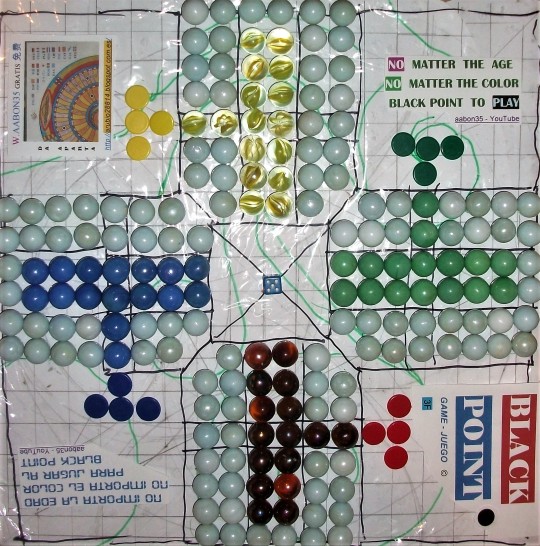
http://arubio28814.blogspot.com
#parchis🎲#blackpointjuego ⚫️#free#ludo#go#parkase http://arubio28814.blogspot.com#bgg#chaupar#marbleball#news#hi#parcheesi#tiktokersleaks#gpt#Elon#Rafa#play#pachisi#parqués#NFT http://aabon35.blogspot.com#bard#parchisi#ia#tiktoklive#boardgame#TikTokライブ配信#aabon35#new#tiktok
20 notes
·
View notes
Text
Man Don't Get Angry (C64, Laze Ristoski, 1999)
Text-mode Parcheesi/Trouble (multiplayer-only). You can play it in your browser here.
In-game controls: 1, 2, 3, 4, G, T. Tips: when you roll a 6, you'll have a choice: T to take a piece out of your stock and put it on the board, or G to go and move a piece already on the board. You can always press Space to skip instead of moving.
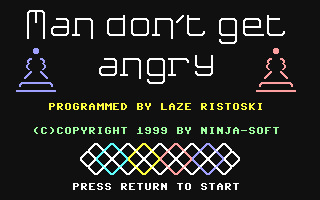
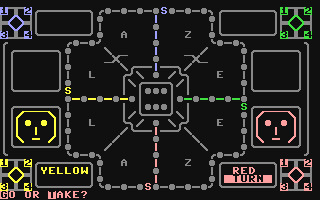
#internet archive#in-browser#c64#commodore#commodore 64#game#games#video game#video games#videogame#videogames#retro graphics#text mode#board game#board games#boardgames#board gaming#pachisi#parcheesi
1 note
·
View note
Text
the most fuckable vampire polls don't even have the two big daddies of vampires; nosferatu (1922) and Betaal (weird little bat guy from Indian folklore who hangs upside down from trees and inanimates dead bodies and is one of the core inspirations for modern day vampires)


(to be clear i think both of them are insanely fuckable)
#muku.priv#vampireposting#vampires#nosferatu#betaal#vetala#vetaal#also google betaal-pachisi. this little guy is gay as fuck.
11 notes
·
View notes
Text
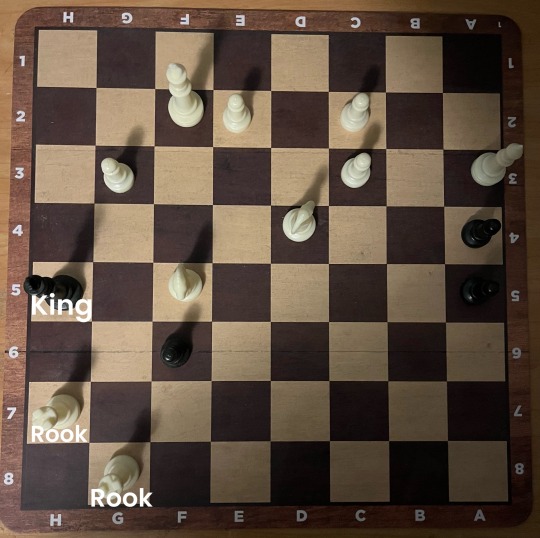
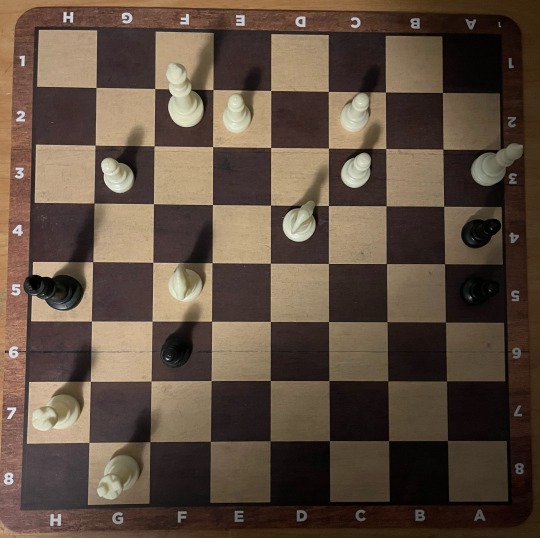
You move King G6 to H5
I move Rook E7 to H7, placing your King in Checkmate.
And that’s the end of the game.
1 note
·
View note
Note
RoR where Buddha and Shiva try to suggest or “hint” at some fun 👀

“Shooo….it sure is hot out here today.” Buddha sighed. Fanning himself with his hand under the shade of a tree.
“Then why don’t you go back inside?”
The demi-god scrunched his mouth at [Y/N]’s totally reasonable remark. Then he tried again. “I don’t want to go in by myself. That would be boring. What I could really use is a nap.”
“Why don’t you nap out here?” They replied. Flipping a page in their book. “You’ve certainly fallen asleep out here before.”
Again, reasonable. “My back is kind of hurting.” He made a big show of stretching before he leaned back against his tree. “I’d like to lay down in a soft bed.”
“So why don’t you go do that. I’ll see you later if you want to take a nap.”
His teeth grit now. “Why don’t you come with me?”
“I’m not finished with my book.”
“You can read your book later!”
“But I want to finish it now.”
“Damnit [Y/N] I’m trying to get you to come to bed with me for something more than a nap!”
His partner blushed at his confession, and he suddenly remembered why he was trying to be subtle. “Sorry. Didn’t mean to shout.”
“I..It’s ok.” They stammered. “I…think we could go inside for a while.” They then replied. “If you still want?”
Buddha grinned devilishly at them and leaned forward. “Oh. I still want.”

“I’m bored.” Shiva announced. Lounging on his great mass of pillow like a cat. “Come play with me.”
“Play?” [Y/N] replied curiously at his request. “What? Like Pachisi?”
“I would rather die.” Shiva grumbled at the thought of playing an actual boardgame. “No, I mean play as in play.” He grinned.
“Oh…that….” They replied. Sitting up straight.
“What? You don’t want to?”
“It’s not that. Just isn’t it Parvati’s day?” With multiple spouses, one had to keep a schedule to make sure everyone had their turn with their lord husband.
“So? Parvati ‘s a good sport.” Shiva saw the schedule a little less of a schedule and more of a suggestion. “She won’t mind if we play a bit before I see her.”
“I think she’d take offense to you going to her while you smelled of me.”
“I’d shower first.” He replied with a nonchalant shrug. “I’m not an animal.”
[Y/N] still didn’t seem convinced. So Shiva reached out to them to stroke their hair. “Come on. You know you want to. You would wear my favorite outfit and sit so close if you weren’t interested.”
“That’s all it takes from you?” They asked. Playfully, but not completely, batting their hand away.
“With you honey, yeah. That’s all it takes.”
#;ask and ye shall receive (request answers)#shiva x reader#record of ragnarok shiva#ror shiva#shiva#buddha x reader#shuumatsu no valkyrie buddha#ror buddha#record of ragnarok buddha#buddha#record of ragnarok scenario#record of ragnarok imagine#ror scenario#ror imagine#scenarios#imagine
556 notes
·
View notes
Text
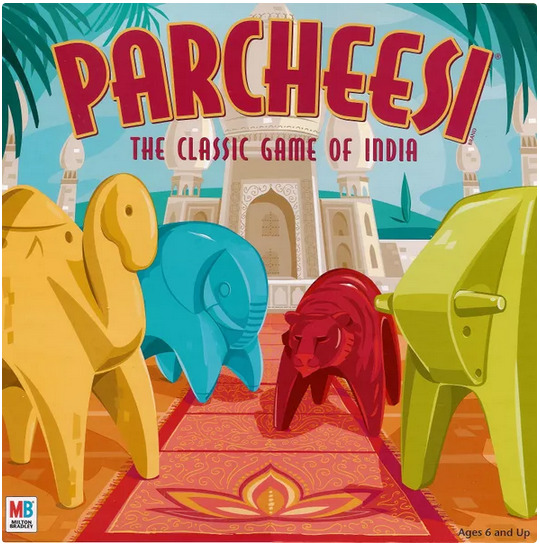
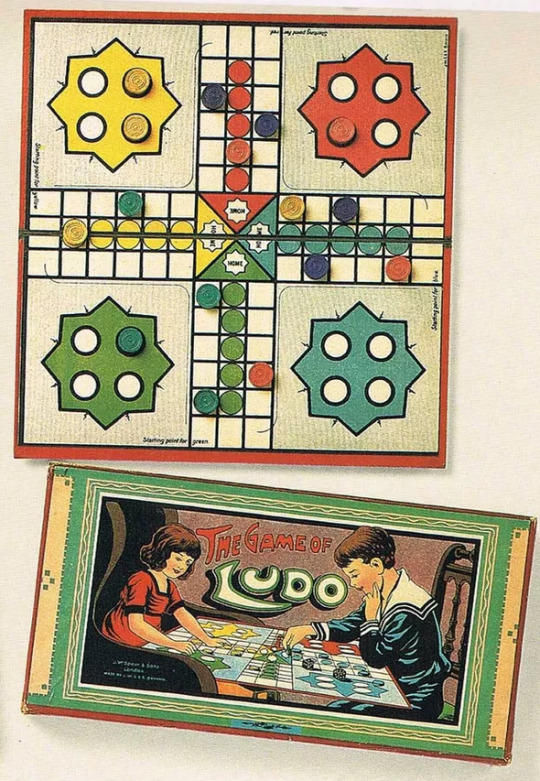
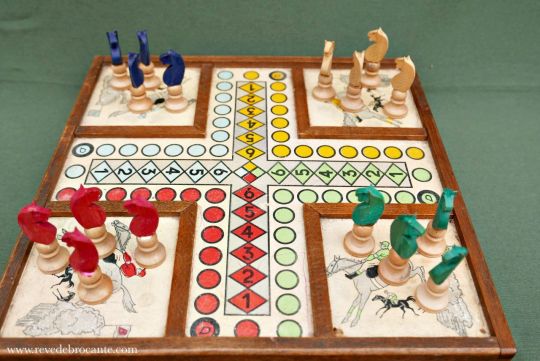
Sorry, this one has a lot of alternative names/rule sets. But I guess that's what happens when a game is literally 1600 years old (at least!)
37 notes
·
View notes
Text
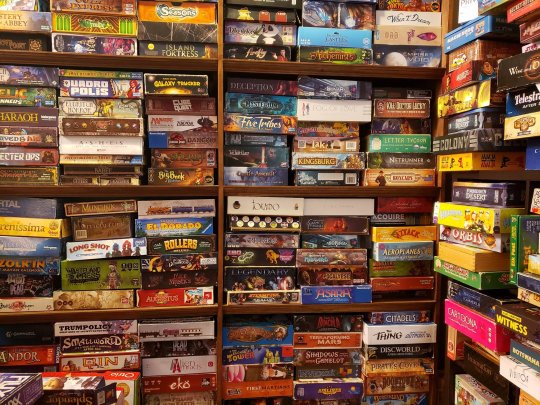
Things you didn't know about board games
Many of us loving playing board games and people have been playing them for millennia. Here's some fun facts about this excellent pastime
1. We have been playing board games for millennia
Chess, checkers, backgammon and Go all have origins in the ancient world. King Tut was buried with multiple sets of an Egyptian game called senet. Hundreds of pieces of Greek pottery depict Ajax and Achilles hunched over a board in the midst of play. And the Ashanti people of Ghana are believed to have created a board game called wari, which you may know as the count-and-capture game mancala.
2. It wasn’t until the 19th century that board games began to be sold commercially
The first, The Mansion of Happiness, came out in England in 1800. The “mansion” was heaven, and players raced to get there. Decades later, an American named Milton Bradley reworked— and rebranded—it as The Checkered Game of Life.
3. Ludo has roots in ancient India, where it was called pachisi
Pachisi is from the Hindi word for “twenty-five,” the highest possible outcome of a single throw. But whereas Americans only tweaked the name to Parcheesi, the British decided to call it Ludo (‘lew-doh), Latin for “I play.” So when Englishman Anthony E Pratt developed his murder-mystery board game in 1943, he called it Cluedo, playing on Ludo. (In some countries, it’s called Clue.)
4. Around the world, the colourful cast of Cluedo can look quite different
Professor Plum was originally called Dr Orange in Spain. Mr Green goes by Chef Lettuce in Chile. Mrs Peacock is Mrs Purple in Brazil and Mrs Periwinkle in France, and in Switzerland, she’s Captain Blue, a man.
5. Board games occasionally inspire screenwriters
There’s the 1985 mystery Clue, the 2012 action movie Battleship and the 2023 fantasy film Dungeons & Dragons: Honour Among Thieves.
6. At least one board game is being adapted into a television show
The game's creator was a famous French filmmaker , Albert Lamorisse, who wrote and directed the 1956 Oscar-winner The Red Balloon, also created a board game he called La Conquête du Monde (Conquest of the World).
Parker Brothers, an American toy and game manufacturer, introduced it to the US soon after, and renamed it Risk.
7. Another game inventor, Alfred Butts, called his game a couple of other names before Scrabble
Butts first called his creation Lexiko, then Criss Cross Words, before settling on Scrabble—a word that means “to hold on to something.” The hugely popular game has been translated into 29 languages and more than 150 million sets have been sold around the world.
8. Over a game of Scrabble, Canadians Chris Haney and Scott Abbott came up with the idea for their game, Trivial Pursuit
Its success launched a years-long legal battle with an American encyclopedist who claimed Haney took trivia from his books, something Haney readily admitted to doing. In the end, the courts decided you can’t steal trivia and dismissed the suit. During the 1980s, Trivial Pursuit outsold even Monopoly, racking up $800 million in sales in 1984 alone.
9. At the highest levels of play, it’s not all fake money
The winner of the World Chess Tournament takes home up to 60 per cent of the €2 million purse, with the runner-up receiving the smaller share. Even the Monopoly world champion takes home real cash: US$20,580, the amount that comes in a standard Monopoly game.
10. Arguably the wrong person is credited with the creation of Monopoly
The American who sold Monopoly to Parker Brothers in the 1930s, Charles Darrow, often receives the credit for creating the game. But it was another American, Elizabeth Magie, who, decades earlier, earned a patent for her invention, The Landlord’s Game.
Players purchased railroads, paid rent and occasionally ended up in jail. Ironically, Magie’s aim with the game was to show the evils of accumulating wealth by bankrupting others.
11. Monopoly was a polarising game in communist countries
Fidel Castro banned it in Cuba, and it was also banned in China for much of the 20th century. But an even more dramatic bit of board game history occurred during the Second World War. Since prisoners of war in Germany were allowed board games, American troops hid maps, compasses and real money inside Monopoly sets to help them escape.
12. The idea for the kids’ classic game Candy Land came from Eleanor Abbott, an American polio patient
In 1949, Abbott wanted to create something for children to play in quarantine. In fact, illness has served as game inspiration many times. In the British mobile-app-turned-board game known as Plague, players take on the role of deadly diseases trying to mutate and spread across the world. Conversely, in Pandemic, created by an American, players try to contain the spread of diseases and discover cures.
13. Thousands of new games are released each year and there's annual awards for the best
How can you tell which ones are worth buying? One reliable indicator is the Spiel des Jahres (“Game of the Year” in German), a prestigious award given each summer by a jury of (mostly German) game critics who volunteer to play and vote for the winning games. Previous award recipients include Settlers of Catan, Dominion and Ticket to Ride.
Daily inspiration. Discover more photos at Just for Books…?
12 notes
·
View notes
Text
Fascinating Facts About the Ludo Game
Ludo is not just a game; it's a cultural phenomenon that spans generations and continents. This board game, beloved by both children and adults alike, offers a delightful mix of luck and strategy. As we explore Ludo’s historical roots, its evolution, and its current global significance, we will uncover the unique mechanics and rules that define the game. Further, we'll delve into the psychological and social benefits it imparts and how it has transitioned seamlessly into the digital age. Finally, we’ll share some fun trivia and lesser-known facts about Ludo, celebrating its rich history and widespread appeal.
Historical Origins
Originating from the ancient Indian game Pachisi, Ludo was transformed into the game we know today by the British in the late 19th century. The original Pachisi was a complex game involving cloth boards, cowrie shells, and intricate rules, played by Indian royalty. This game was adapted to the simpler, dice-based Ludo, patented in England in 1896, which aimed to be accessible to a broader audience. Through this transformation, Ludo retained the core concept of moving pieces based on dice rolls but introduced a simplified board layout and rules that appealed to families, especially in the Western world.
Global Appeal
Ludo has become a household staple across the globe, thanks to its straightforward gameplay that requires minimal setup and can be understood by players of all ages. Different countries and cultures have adapted Ludo, incorporating local elements and rules to create regional variations. For example, in some Caribbean nations, Ludo boards are beautifully hand-painted with vibrant colors, reflecting local artistic styles. These variations not only demonstrate Ludo’s adaptability but also its ability to integrate into and celebrate diverse cultures.
Game Mechanics and Rules
Ludo is played on a square board divided into a grid, with a distinct path leading from each player’s base to the center home triangle. Ludo Players take turns rolling a single die, moving their four pawns out of their home base and around the board to the finish line, while also attempting to capture and send back opponents' pawns. The requirement to roll a six to start, combined with the strategic decisions involved in capturing others and safeguarding one’s own pawns, adds depth to what seems like a simple race. This balance of luck and strategy makes Ludo endlessly replayable and engaging.
Psychological and Social Benefits
Ludo is more than entertainment; it's a tool for cognitive development and social interaction. The game requires players to think ahead, predict opponents' moves, and strategically plan their journey across the board, sharpening decision-making and problem-solving skills. Socially, Ludo encourages family bonding and friendship over competitive yet friendly gameplay. It fosters communication and team-building skills, as players often team up in pairs for a more collaborative experience.
Digital Transformation of Ludo
The rise of the internet and mobile gaming platforms has given traditional board games like Ludo a new lease on life. Online platforms allow players from different geographical locations to compete against each other, bringing the community closer together. Digital versions of Ludo, such as those offered by platforms like Zupee, maintain the essence of traditional Ludo while introducing new elements like online leaderboards, multiplayer options, and virtual Ludo tournaments. These platforms provide a space where Ludo enthusiasts can compete at a higher level and engage with a global community.
Fun Trivia and Lesser-Known Facts
Ludo has been part of some intriguing historical anecdotes. For instance, during World War I, British soldiers played Ludo to pass the time in the trenches, modifying the board to be foldable and pocket-sized. Additionally, despite its reputation as a children's game, Ludo has seen competitive play among adults with organized tournaments that showcase the game's strategic depth.
Conclusion
Ludo's enduring appeal lies in its simplicity and the deep connection it fosters among players. From its royal Indian roots to its modern digital form, Ludo has evolved while still retaining its core characteristics that appeal to human psychology and social interaction. Whether played on a physical board with family or through an online platform with strangers, Ludo continues to be a source of joy, learning, and connection. This timeless game is a testament to the simple pleasures that can bring people together, encouraging more individuals to explore and enjoy the myriad benefits that Ludo has to offer.
2 notes
·
View notes
Text
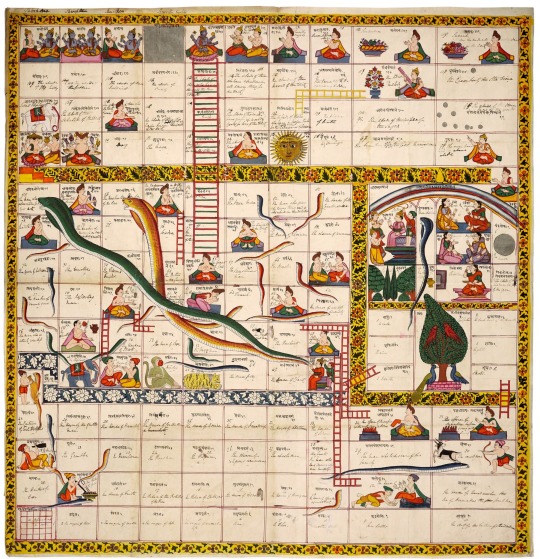
An illustration depicting the game of Snakes and Ladders, North-west or Western India, early 19th century
Gouache heightened with gold and silver on paper, laid down on cloth, further laid down on later board, with inscriptions in black devanagari script accompanied by English translations in black ink below, framed.
The game of Snakes and Ladders originated in medieval India where it was known as moksha patam, part of a family of games played using dice including chaupar and pachisi. The game is seen as a representation of man’s upward course in religious life. A person can attain salvation (moksha) through performing good deeds or be reborn as lower forms of life due to bad deeds. The ladders in the game symbolise virtues and the snakes are vices. The chart in the present illustration comprises 128 squares, each labelled and numbered in Sankrit with a translation in English below. The game begins at the bottom left corner and finishes at square 124 which is occupied here by a seated figure of the Hindu deity Vishnu. The players ascend the squares through states associated with hell, to moral and spiritual states, finally arriving at the squares associated with salvation and enlightenment. The ladders connect the ‘good’ squares and accelerate the players’ ascent while the snakes connect the ‘bad’ ones reversing their progress.
Sotheby’s
102 notes
·
View notes
Text
Unveiling the Popularity of Real Money Ludo in India
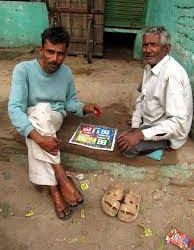
In the bustling streets of India, where culture and tradition intertwine with modernity, a classic game has found new life in the digital era. Ludo, a game cherished by generations, has undergone a remarkable transformation, evolving from a simple pastime to a source of entertainment and excitement. In this blog, we delve into the phenomenon of Real Money Ludo games and uncover the reasons behind its soaring popularity in India.
The Cultural Significance of Ludo
Ludo holds a special place in the hearts of Indians, transcending age, gender, and social boundaries. Originating from the ancient Indian game of Pachisi, Ludo has been a part of Indian households for decades, bringing families and friends together for moments of joy and laughter. Its simple rules and unpredictable nature make it a favorite pastime during gatherings and festivals.
The Rise of Real Money Ludo
With the advent of online gaming platforms, Ludo has undergone a digital revolution, paving the way for Real Money Ludo. This innovative concept allows players to compete for real cash prizes while enjoying the thrill of the game. In a country where gaming is deeply ingrained in the culture, Real Money Ludo has emerged as a popular choice among players seeking entertainment and rewards.
Accessibility and Convenience
One of the key factors driving the popularity of Real Money Ludo in India is its accessibility and convenience. With smartphones becoming ubiquitous across the country, players can easily download Ludo apps and participate in real money ludo games from the comfort of their homes. This accessibility has democratized gaming, allowing players from diverse backgrounds to engage in competitive gameplay and win cash prizes.
Social Interaction and Community Building
Real Money Ludo goes beyond mere entertainment; it fosters social interaction and community building. In a country known for its strong sense of community, Real Money Ludo serves as a platform for friends and family to connect, compete, and celebrate together. With features such as multiplayer modes and in-game chat, players can engage in friendly banter, form alliances, and forge lasting friendships.
Economic Empowerment and Financial Independence
For many Indians, Real Money Ludo represents more than just a game; it offers a pathway to economic empowerment and financial independence. With the opportunity to win real cash prizes, players can supplement their income, support their families, or pursue their dreams. In a country with a burgeoning youth population and a growing digital economy, Real Money Ludo provides a platform for individuals to showcase their skills and achieve their goals.
Conclusion: A Game Changer in Indian Gaming
As we conclude our exploration of the popularity of Real Money Ludo games in India, one thing becomes evident – it has become a cultural phenomenon that transcends boundaries and bridges generations. From its humble origins to its digital reincarnation, Ludo continues to captivate the hearts and minds of millions across the country. With its blend of tradition, innovation, and opportunity, Real Money Ludo has emerged as a game changer in the Indian gaming landscape, ushering in a new era of entertainment, engagement, and empowerment.
#ludo cash games#ludo money#ludo real money#play ludo with real money india#zupee ludo apk download#ludo real money games#real money ludo games
4 notes
·
View notes
Text
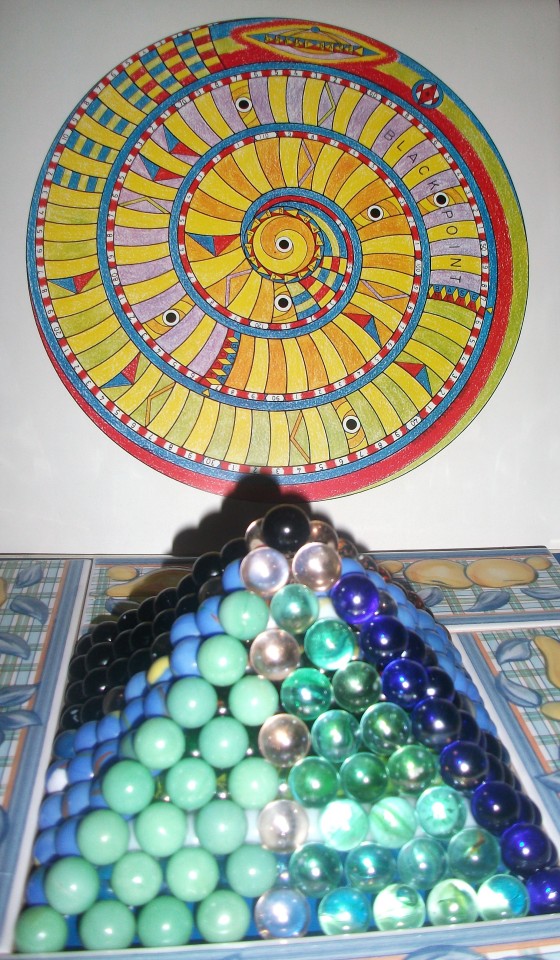

#blackpointgame #free #ludo #parkase #bgg #chaupar #news #ai #parcheesi #tiktokersleaks #gpt #Elon #Rafa #play #parchis #pachisi # parqués #NFT http://aabon35.blogspot.com #bard #parchisi # ia #tiktoklive #boardgame #TikTokライブ配信# aabon35 http://arubio28814.blogspot.com #new #tiktok
#blackpointgame ⚫️#free 🎲#ludo#parkase#bgg#chaupar#news#ai#parcheesi#tiktokersleaks#gpt#Elon#Rafa#play#parchis#pachisi#parqués#NFT#boardgamegeek http://aabon35.blogspot.com#bard#parchisi#ia#tiktoklive#boardgame#TikTokライブ配信#aabon35 http://arubio28814.blogspot.com#new#tiktok
16 notes
·
View notes
Conversation
Chain of Thorns, page 597:
Anna: "We are made up of different parts, sad and happy, strong and weak, solitary and in need of others. And there is nothing shameful about that."
Ari: "If we are all made up of different parts, then I am quite the chessboard."
Anna: "Never a chessboard. Nothing so plain. You are a brightly colored pachisi board. You're a backgammon set with triangles of inlaid mother of pearl and pieces of gold and silver. You are the queen of hearts."
#shadowhunter quotes#cot#chain of thorns#arianna#anna and ariadne#anna x ariadne#anna lightwood#ariadne bridgestock#the last hours#tlh
19 notes
·
View notes
Text
Olivia's Cove is impossible to pass while the curse isn't lifted. Which means we need to fix that before we can find the Gaia Sword. And while that's all well and good, you know what's worse? My luck at Pachisi today!!
#dragonquest3 #retro #toriyama #snes
youtube
#Dragon Quest III#Dragon Warrior 3#NES#GBC#SNES#RPG#JRPG#Anime#Akira Toriyama#Koichi Sugiyama#Yuji Horii#Enix#SquareEnix#ChunSoft#Nintendo#Gameboy Color#Retro#Grinding#1986#2000#Role Playing Game#Fantasy#Monsters#Sword and Sorcery#Youtube
1 note
·
View note
Text
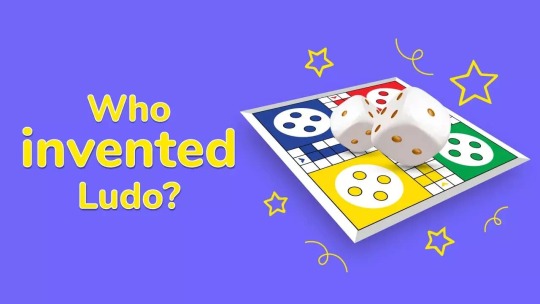
Ludo Bheem: The Gateway to Gaming Riches
Ludo, a classic board game enjoyed by millions worldwide, has a rich and intriguing ludo game history. Its origins can be traced back to ancient India, where it was known as "Pachisi." Pachisi was played by Indian royalty as early as the 6th century, and it featured a cross shaped board and pieces moved according to the throw of six or seven cowrie shells, with the objective of reaching the center.
1 note
·
View note
Text
The Ultimate Guide to Ludo Game Download
In the realm of digital entertainment, few pastimes have stood the test of time quite like Ludo. Originating from the ancient Indian game of Pachisi, Ludo has evolved into a beloved classic enjoyed by millions worldwide. With the advent of smartphones, Ludo has found a new home in the digital landscape, offering enthusiasts the chance to enjoy the game anytime, anywhere.
Introduction to Ludo
Ludo is a board game that involves moving tokens around a board to reach the center before opponents. Its simple yet engaging gameplay makes it suitable for players of all ages. The game typically features four colored tokens and a dice, with players taking turns to roll the dice and move their tokens accordingly.
The Appeal of Ludo
What makes Ludo so appealing? The answer lies in its combination of strategy and luck. While players must employ tactics to outmaneuver their opponents, the element of chance introduced by the dice adds an exciting twist to every game. Whether you're a seasoned strategist or a casual gamer looking for some fun, Ludo game download offers something for everyone.
The Rise of Digital Ludo
In recent years, the popularity of Ludo has surged thanks to its availability on mobile devices. With just a few taps, players can download Ludo games from app stores and dive into thrilling matches with friends or strangers online. The convenience of digital Ludo has made it a go-to option for gaming enthusiasts seeking entertainment on the go.
How to Download Ludo Games
If you're eager to join the Ludo craze, downloading a Ludo game is a breeze. Simply follow these steps:
Step 1: Visit the App Store
Open the app store on your smartphone or tablet. Whether you're using an iOS device or an Android device, you'll find a wide selection of Ludo games available for download.
Step 2: Search for Ludo Games
Use the search bar to look for Ludo games. You can enter keywords like "Ludo," "Ludo King," or "Ludo Star" to narrow down your options.
Step 3: Choose a Game
Browse through the search results and read reviews to find the Ludo game that best suits your preferences. Pay attention to factors such as graphics, gameplay features, and user ratings.
Step 4: Download and Install
Once you've selected a Ludo game, tap the download button to initiate the installation process. Depending on your internet connection speed, the download may take a few moments.
Step 5: Start Playing
Once the Ludo game has been downloaded and installed, launch the app and start playing! You can enjoy matches against AI opponents, challenge your friends, or compete with players from around the world.
Conclusion
In conclusion, Ludo remains a timeless classic that continues to captivate audiences worldwide. With the availability of Ludo game download on mobile devices, enjoying this beloved pastime has never been easier. Whether you're a seasoned player or a newcomer to the world of Ludo, there's no better time to download a Ludo game and experience the thrill for yourself.
0 notes
Note
Oh what about
- Mastermind
- Jeu des petits chevaux (lit. 'game of small horses') : it's very popular in France. Even more than Monopoly. I think every kid born in an era where video games were less dominant has played it.
- Snakes and Ladders
Anon, I would like a little clarification on Jeu des petits chevaux. Does that game look anything like this?
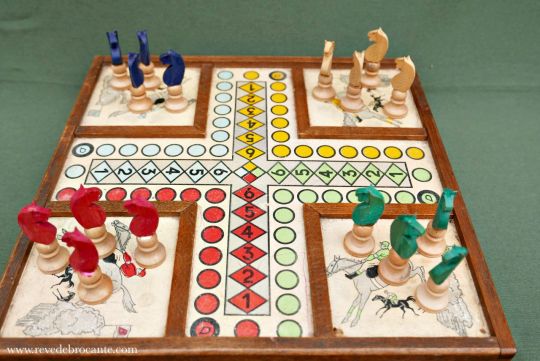
Because if so, it looks SUPER similar to a game I grew up playing called Parcheesi/Pachisi. A little bit of Googling has confirmed for me that the two games are related, but if they have distinct enough rules sets then I'll list them as separate games.
9 notes
·
View notes